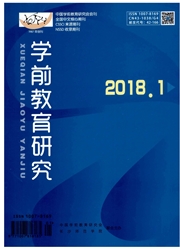

 中文摘要:
中文摘要:
利他惩罚行为是个体为惩罚违反社会规范的人而自愿支付个人成本的行为,是一种明显的亲社会行为,虽然这种行为本身不能直接增进群体中其他个体的生存适应性,但通过维护合作秩序能够促进整个群体的平均适应性。利他惩罚行为是幼儿合作和公平意识发展的重要组成部分,对幼儿道德和亲社会行为的发展具有重要促进作用。本研究随机选取120名3—5岁幼儿,采用现场行为实验与访谈分析法,考察涉及不同自身利益时3~5岁幼儿利他惩罚行为的发展特点,并对其心理机制进行分析。现场行为实验结果发现幼儿年龄的主效应显著,3岁幼儿在不公平分配的情境下已经产生利他惩罚行为,4岁幼儿利他惩罚行为发展最为明显,5岁幼儿利他惩罚行为趋于稳定。与此同时存在显著的情境主效应,各年龄组幼儿在第二方视角下的利他惩罚行为均高于第三方视角下的利他惩罚行为。此外,年龄与性别的交互作用显著,对3岁组幼儿来说,男孩的利他惩罚行为显著高于女孩,但4岁和5岁组性别差异均不显著;年龄与情境交互作用显著,对4岁组幼儿来说,第二方视角下幼儿利他惩罚行为显著高于第三方视角,其他年龄组视角差异不显著。访谈分析结果发现3岁是利他惩罚行为的萌芽阶段,幼儿此时还不能很好地表达自己的意图;4岁幼儿开始考虑自身利益,5岁幼儿更是较多地考虑自身利益。家长和教师可以通过创设公平合理的学前教育环境,及时有效地规避幼儿由不公平情境引起的消极情绪与攻击性行为;采用奖励与强化、实践与传授等方式培养幼儿的共情能力;通过观察学习等途径促进幼儿利他惩罚等亲社会行为的健康发展。
 英文摘要:
英文摘要:
Altruistic punishment behavior is the behavior of individuals who are willing to pay personal cost to punish other people who violate social norms. This behavior itself can't directly enhance the survival of other individuals in the groups, but can maintain the order of cooperation and promote the average adaptability of the whole group. Altruistic punishment behavior development has an important role in promoting children's moral development and prosocial behavior as an important part of children's cooperation de velopment and sense of fairness. In this study, 120 children aged 3-5 years old were randomly selected, and the live behavior test and interview analysis method were used. The results showed that the main effect of age was significant. Children of 3 years old had been to show altruistic punishment behavior in the unfair distribution situation, while the development of 4 years old children's altruistic punishment be hav ior was most obvious, and that of 5 years old tended to be stable. The main effect of perspective was also significant. Children's altruistic punishment behavior in the second party perspective was higher than that in the third party perspective. The interaction between age and sex was significant, which meant that 3 years old boy's altruistic behavior was significantly higher than that of 3-year-old girls. Age and perspective interaction was significant, which meant 4 years old children's altruistic punishment behavior in the second party per- spective was significantly higher than that in the third party perspective. Interview analy sis found that 3 years old children's altruistic punishment behavior was in the embryonic stage and they couldn't express their intentions very well. 4 years old children began to consider their own interests, and 5 years old considered their own interests more. Parents and teachers should create a fair and reasonable environment to avoid negative emotions and aggressive behaviors caused by the unfair situation. Cultivating children's emp
 同期刊论文项目
同期刊论文项目
 同项目期刊论文
同项目期刊论文
 期刊信息
期刊信息
